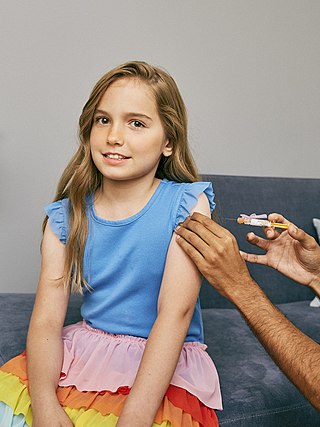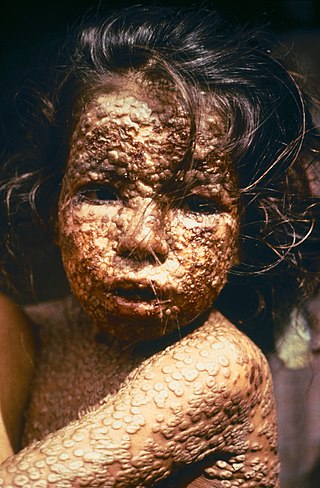
Edward Jenner, was an English physician and scientist who pioneered the concept of vaccines and created the smallpox vaccine, the world's first vaccine. The terms vaccine and vaccination are derived from Variolae vaccinae, the term devised by Jenner to denote cowpox. He used it in 1798 in the title of his Inquiry into the Variolae vaccinae known as the Cow Pox, in which he described the protective effect of cowpox against smallpox.

Vaccination is the administration of a vaccine to help the immune system develop immunity from a disease. Vaccines contain a microorganism or virus in a weakened, live or killed state, or proteins or toxins from the organism. In stimulating the body's adaptive immunity, they help prevent sickness from an infectious disease. When a sufficiently large percentage of a population has been vaccinated, herd immunity results. Herd immunity protects those who may be immunocompromised and cannot get a vaccine because even a weakened version would harm them. The effectiveness of vaccination has been widely studied and verified. Vaccination is the most effective method of preventing infectious diseases; widespread immunity due to vaccination is largely responsible for the worldwide eradication of smallpox and the elimination of diseases such as polio and tetanus from much of the world. However, some diseases, such as measles outbreaks in America, have seen rising cases due to relatively low vaccination rates in the 2010s – attributed, in part, to vaccine hesitancy. According to the World Health Organization, vaccination prevents 3.5–5 million deaths per year.

A vaccine is a biological preparation that provides active acquired immunity to a particular infectious or malignant disease. The safety and effectiveness of vaccines has been widely studied and verified. A vaccine typically contains an agent that resembles a disease-causing microorganism and is often made from weakened or killed forms of the microbe, its toxins, or one of its surface proteins. The agent stimulates the body's immune system to recognize the agent as a threat, destroy it, and to further recognize and destroy any of the microorganisms associated with that agent that it may encounter in the future.

The smallpox vaccine is the first vaccine to have been developed against a contagious disease. In 1796, British physician Edward Jenner demonstrated that an infection with the relatively mild cowpox virus conferred immunity against the deadly smallpox virus. Cowpox served as a natural vaccine until the modern smallpox vaccine emerged in the 20th century. From 1958 to 1977, the World Health Organization (WHO) conducted a global vaccination campaign that eradicated smallpox, making it the only human disease to be eradicated. Although routine smallpox vaccination is no longer performed on the general public, the vaccine is still being produced to guard against bioterrorism, biological warfare, and mpox.

James John Garth Wilkinson, was an English homeopathic physician, social reformer, translator and editor of Swedenborg's works, and a writer on Swedenborgian topics.
This is a timeline of the development of prophylactic human vaccines. Early vaccines may be listed by the first year of development or testing, but later entries usually show the year the vaccine finished trials and became available on the market. Although vaccines exist for the diseases listed below, only smallpox has been eliminated worldwide. The other vaccine-preventable illnesses continue to cause millions of deaths each year. Currently, polio and measles are the targets of active worldwide eradication campaigns.

Hilary Koprowski was a Polish virologist and immunologist active in the United States who demonstrated the world's first effective live polio vaccine. He authored or co-authored over 875 scientific papers and co-edited several scientific journals.

Oswaldo Gonçalves Cruz, better known as Oswaldo Cruz, was a Brazilian physician, pioneer bacteriologist, epidemiologist and public health officer and the founder of the Oswaldo Cruz Institute.

Donald Ainslie Henderson was an American medical doctor, educator, and epidemiologist who directed a 10-year international effort (1967–1977) that eradicated smallpox throughout the world and launched international childhood vaccination programs. From 1977 to 1990, he was Dean of the Johns Hopkins School of Public Health. Later, he played a leading role in instigating national programs for public health preparedness and response following biological attacks and national disasters. At the time of his death, he was Professor and Dean Emeritus of the Johns Hopkins Bloomberg School of Public Health, and Professor of Medicine and Public Health at the University of Pittsburgh, as well as Distinguished Scholar at the UPMC Center for Health Security.

Vaccine hesitancy is a delay in acceptance, or refusal, of vaccines despite the availability of vaccine services and supporting evidence. The term covers refusals to vaccinate, delaying vaccines, accepting vaccines but remaining uncertain about their use, or using certain vaccines but not others. The scientific consensus that vaccines are generally safe and effective is overwhelming. Vaccine hesitancy often results in disease outbreaks and deaths from vaccine-preventable diseases. Therefore, the World Health Organization characterizes vaccine hesitancy as one of the top ten global health threats.

The National Anti-Vaccination League (NAVL) was a British anti-vaccination organization that was formed in 1896 from earlier smaller organizations. Historically, the League had opposed compulsory vaccination, particularly against smallpox. It was part of a wider anti-vaccinationist movement, arguing that vaccination did more harm than good.

William Tebb was an English businessman and wide-ranging social reformer. He was an anti-vaccinationist and author of anti-vaccination books. He was also concerned about premature burial.
Vaccination and religion have interrelations of varying kinds. No major religion prohibits vaccinations, and some consider it an obligation because of the potential to save lives. However, some people cite religious adherence as a basis for opting to forego vaccinating themselves or their children. Many such objections are pretextual: in Australia, anti-vaccinationists founded the Church of Conscious Living, a "fake church", leading to religious exemptions being removed in that country, and one US pastor was reported to offer vaccine exemptions in exchange for online membership of his church.

Smallpox was an infectious disease caused by variola virus which belongs to the genus Orthopoxvirus. The last naturally occurring case was diagnosed in October 1977, and the World Health Organization (WHO) certified the global eradication of the disease in 1980, making smallpox the only human disease to be eradicated.
Variolation was the method of inoculation first used to immunize individuals against smallpox (Variola) with material taken from a patient or a recently variolated individual, in the hope that a mild, but protective, infection would result. Only 1–2% of those variolated died from the intentional infection compared to 30% who contracted smallpox naturally. Variolation is no longer used today. It was replaced by the smallpox vaccine, a safer alternative. This in turn led to the development of the many vaccines now available against other diseases.
The 1947 New York City smallpox outbreak occurred in March 1947 and was declared ended on April 24, 1947. The outbreak marked the largest mass vaccination effort ever conducted for smallpox in America. Within three weeks of the discovery of the outbreak, the U.S. Public Health Service, in conjunction with New York City health officials, had procured the smallpox vaccine and inoculated over 6,350,000 adults and children. Of that number, 5,000,000 had been vaccinated within the first two weeks. The rapid response was credited with limiting the outbreak to 12 people, 10 of whom recovered, while 2 died.
Inoculation is the act of implanting a pathogen or other microbe or virus into a person or other organism. It is a method of artificially inducing immunity against various infectious diseases. The term "inoculation" is also used more generally to refer to intentionally depositing microbes into any growth medium, as into a Petri dish used to culture the microbe, or into food ingredients for making cultured foods such as yoghurt and fermented beverages such as beer and wine. This article is primarily about the use of inoculation for producing immunity against infection. Inoculation has been used to eradicate smallpox and to markedly reduce other infectious diseases such as polio. Although the terms "inoculation", "vaccination", and "immunization" are often used interchangeably, there are important differences. Inoculation is the act of implanting a pathogen or microbe into a person or other recipient; vaccination is the act of implanting or giving someone a vaccine specifically; and immunization is the development of disease resistance that results from the immune system's response to a vaccine or natural infection.
Valentine Seaman was an American physician who introduced the smallpox vaccine to the United States and mapped yellow fever in New York City. His contributions to public health also include women's education in nursing and midwifery.
Anti-vaccinationism in chiropractic is widespread, but there are notable differences within the trade. Chiropractic is a form of alternative medicine founded on the idea that all disease is caused by disruption of the flow of "innate" in the spine, by so-called vertebral subluxations – a pseudoscientific concept. Over time chiropractic has divided into "straights" who adhere to the subluxation theory and "mixers" who adhere more closely to a reality-based view of anatomy. "Straight" chiropractors are very likely to be anti-vaccination, but all chiropractic training tends to reduce acceptance of vaccines.
Israel Weinstein was an American physician and bacteriologist, best known for his work in public health in New York City, especially during the 1947 New York City smallpox outbreak as the Commissioner of Health of the City of New York from March 13, 1946, to November 3, 1947, under Mayor William O'Dwyer.











